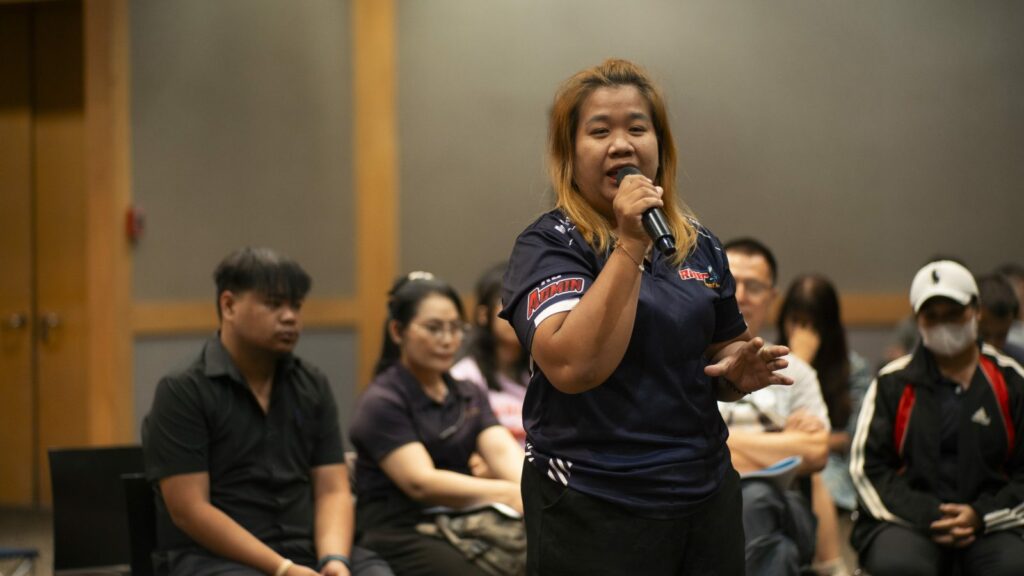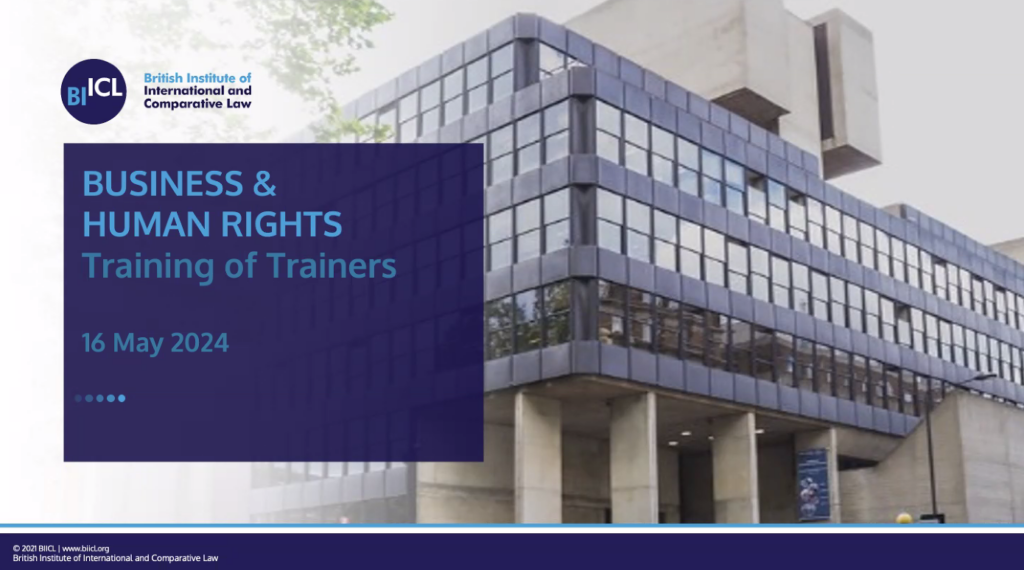Dear Readers,
May is a significant month for the labor movement worldwide. It is a time to reflect on the importance of workers in all professions, who are the driving force behind our economy and society. It is also a period of celebration and recognition of the achievements of the labor movement, which has long fought for rights and equality. In Thailand, labor issues continue to present many points of interest that need to be monitored. JELI has gathered the month’s activities for everyone to keep track of in this newsletter.

Important News
May Day 2024: 29 Demands from the Northern Labor Network




1 May 2024 – JELI joined May Day 2024 in Chiang Mai, held by The Northern Labor Network. International Workers’ Day not only serves as a reminder of the importance of workers worldwide but also provides a platform for discussing and understanding the issues faced by different groups of workers to collectively propose solutions to improve labor conditions and promote a better quality of life for all workers.
Representatives from various labor groups marched to present their demands to the Governor of Chaing Mai. These 29 demands encompass rights and benefits that workers are entitled to, including issues such as minimum wage, rights to unionization, enforcement of existing labor laws, social security coverage, and the repeal of value-added tax on sanitary pads, among others.
Part of the demands made during May Day 2024 by the Northern Labor Network are:
- The government should set a minimum wage of no less than 700 baht per day to match the cost of living and the growing economy, especially in the tourism sector, using the Living Wage principle.
- The government and parliament must promote freedom of association and rights to collective bargaining among all types of workers, particularly public sector and migrant workers, allowing them to freely form unions for collective bargaining, adhering to the principles of ILO Convention No. 87 on Freedom of Association and Protection of the Right to Organize and Convention No. 98 on the right to Right to Organize and Collective Bargaining.
- The government, parliament, and social security board should ensure that all workers have access to the social security system regardless of occupation or employment status, increasing benefits accordingly.
- The government must protect all workers without discrimination and ensure that all workers are covered under the same labor protection laws.
In the evening, the activity consisted of a march/rally from the Three Kings Monument to Tha Phae Gate. Within the event, there were performances by the Northern Labor Network, poetry readings, and demands presented to participating political parties, including the Move Forward and Commoners Party. There was also a dialogue session where representatives discussed various issues.
- Migrant Workers Federation: Migrant workers often do not have access to social welfare benefits and sometimes earn wages below the legal minimum. They are often exploited by employers, working throughout the year without any savings.
- BEAM Education Foundation: The current social and political situation has led to a significant number of migrant workers from Myanmar. It is necessary to push for mechanisms for migration, access to work and education, and to ensure humane treatment.
- Women Workers for Justice Group: Women workers play dual roles as both mothers and laborers. They face difficulties, especially during menstruation without any days off. Their wages are not equal to male workers. It is proposed that free sanitary products be distributed and that women workers be allowed to take a day-off during menstruation.
- Sex Workers: The repeal of the Prevention and Suppression of Prostitution Act is requested so that sex work can be recognized as a legitimate profession, allowing them to access social security and receive the same protections as other professions without having to pay commissions to employers.
- NGO Workers: NGO workers are often tied to the idea of “working for society” to the extent that they overlook fairness in employment, including appropriate wages and working hours. It is crucial to encourage workers to speak up about their working conditions.
- Thai Frontline Physician Union: Problems with working hours in the medical system, reimbursement, and professional hierarchy. Currently, doctors are resigning one after another, leading to heavier workloads and reduced quality of care. Doctors and medical students who work tirelessly should look at society from a broader perspective to address these issues.
- Barista Labor Union: The situation of tourism service workers in Chiang Mai, where there are many quality workers who cannot afford to live in the city. There is a misconception that Chiang Mai can offer low wages because of its low cost of living, which does not reflect reality. Tourist service workers, who are vital to the economy, deserve fair wages and adequate benefits.
The event concluded with a joint statement from labor groups, marking International Workers’ Day 2024 as the beginning of change, urging all workers to unite and rise up, as “the rights of workers worldwide today have all come from struggles, not requests.”
Women Riders Leading the Gig Workers’ Rights Movement in Thailand

Rest of World published an article telling the story of female riders who are becoming a driving force in the movement for gig workers’ rights in Thailand.
We often have the image of riders predominantly being male, delivering food and goods on motorbikes on the streets. However, the number of female riders has increased significantly due to the economic conditions during the COVID-19 pandemic. Until today, female riders still face harassment and discrimination from customers and their peers, and they still lack adequate support from platform companies. Even in accidents, injuries, or fatalities, riders have to come together to help themselves. This has led female riders like Ja, the founder of Rider Center; Muk, a core member of the Fast Moving Group; and Mam, the founder of Thonburi Rider Group, to play crucial roles in building networks for uniting and supporting fellow rider group members. Despite the importance of their contributions, these roles have yet to gain widespread recognition.
Source: Rest of World
Nationwide Minimum Wage Increase to 400 Baht

The Cabinet meeting on May 14, 2024, acknowledged the progress in setting a nationwide minimum wage of 400 baht per day. The implementation is expected to be announced in the Royal Gazette for enforcement between September and October 2024. The timeline for the implementation is as follows:
- April to June 2024: Surveying necessary expenses for new industrial workers entering the workforce in 2024.
- May 2024: Consultation on the impact of the proposed minimum wage increase with the Federation of Thai Industries and the Thai Chamber of Commerce.
- May to August 2024: The Wage Committee reviews criteria for reassessing provincial minimum wage rates to ensure consistency with legal standards and nationwide uniformity.
- September to October 2024: The Wage Committee reviews proposals for minimum wage rates from all Provincial Wage Sub-committee and the Subcommittee on Technical Affairs and Review to finalize and publish the new rates in the Royal Gazette.
Most recently, the Wage Committee resolved to have the Provincial Wage Sub-committee gather data on wage increases across the country. The process is required to be completed within July 2024 to ensure that the minimum wage adjustment proceeds according to the established timeline.
Source: Royal Thai Government, The Active
Meetings & Workshops


3 May 2024 – The Committee on Labor organized a seminar to receive feedback and suggestions on Employment Problems, Working Skills Enhancement, and the Establishment of Provincial Labor Councils from representatives of government agencies under the Ministry of Labor, labor experts, employers, workers, and related agencies.
Representatives from JELI, along with representatives from platform labor groups and migrant workers, attended the seminar to share and discuss their perspectives on employment issues. Regarding platform workers, there’s been an emphasis on the unclear definition of employment, where companies are not considered employers but just business partners. This leaves workers unprotected by the law and the company unregulated, lacking accountability to legal obligations. Therefore, proposals are made to clarify the definition of employment for legal protection, allowing workers to negotiate fairly with employers. As for migrant workers, problems were raised starting from the job application process, which includes mandatory job application fees. Most migrant workers, especially those in the construction and agricultural sectors, do not receive the minimum wage. Additionally, the process related to work permits is complicated, and workers often face discretion by officials when issues arise or requests for assistance are made.

14 & 16 May 2024 – JELI representatives attended the “Business & Human Rights: Training of Trainers” workshop, organized by the British Institute of International and Comparative Law (BIICL). This workshop, held under the GLP-Power project, aims to enhance the capacity for organizing and unionizing informal sector workers. The training focused on both theoretical and practical aspects of business and human rights. It covered a comprehensive overview of legal developments and best practices for respecting human rights worldwide, including case studies of human rights violations by businesses. In addition to labor rights, the training also addressed rights related to natural resources and the environment.
Human rights and business in the informal economy pose significant challenges, as most informal workers lack legal protection and employers often dictate employment conditions. This makes implementing human rights and business principles particularly difficult. In Thailand, the National Action Plan on Business and Human Rights (NAP) aims to ensure that businesses do not negatively impact human rights. This requires cooperation from all stakeholders, including labors, the government, society, and the business sector.


18-19 May 2024 – JELI conducted a training session for 25 female riders and leaders of the Southern Riders Association in Krabi. The aim was to educate riders, most of whom had never joined a group or received information before, about their rights as workers under labor protection laws.
Riders are often referred to as independent workers or partners of the platform companies, which leads to a lack of awareness about their rights. Platform companies have continuously reduced the pay-per-delivery rate, and riders lack bargaining power due to their unawareness of their rights. These rights include the freedom of association, the right to collective bargaining, social security, and the compensation fund. To ensure that dispersed riders are aware of these fundamental rights, JELI has organized this training, which will continue throughout the year.


20 May 2024 – 29 delivery riders members of the Riders Center in Bangkok joined the meeting and discussion on traffic laws and legal issues in relation to traffic accidents. Two traffic police officers were invited to speak and answer questions on the relevant laws and procedures involved when a traffic accident occurs. In the afternoon, the riders participated in CPR training session with facilitators who are members of the professional rescue team from a hospital in Bangkok.
On the same day, the key leaders of the group discussed with the members on campaign activity related to occupational health and safety and work injury compensation fund which is the labour legislation the Riders Center has been demanding the government to extend its coverage to gig workers. The Riders Center members then discussed the recommendations of the National Human Rights Commission which underpin Employment Relationship between riders and platform companies. Members of the Riders Center voiced out the need to step up campaign advocacy for the government to enforce the labour laws on platform companies.
The group also plans to campaign with the newly elected Social Security Board next month. The Social Security Board has a function on overseeing social security policies, measures and regulations on social benefits. The Riders Center will call on the Social Security Board to review the existing policies and social security law as well as the work injury compensation fund and propose for extension of the coverage to gig workers.


24 May 2024 – JELI organized a workshop named “Participatory Workshop in Organizing Migrant Workers for Trade Unions” at the Asia Hotel. The event was attended by representatives from various migrant worker organizations, including the Women Workers for Justice Group, Migrant Workers Federation, Yaung Chi Oo Workers Association (YCOWA), United Friends Labor Union, Raks Thai Foundation, and Labour Rights Foundation.
The workshop was divided into three sessions. The first session focused on the reflection on alternative forms of migrant workers organizations. Each group presented their background, organizational structure, key advocacy issues, and successful case studies to provide insights for other groups. The second session involved extracting lessons learned on strengthening alliance building among migrant workers and developing networks for the collective power promotion, with each group sharing distilled recommendations from their experiences.
In the third session, participants brainstormed on “Way forward to Achieving Migrant Workers’ Goals” with participants divided into three groups. Key findings on the main issues faced by migrant workers included the right to organize and join unions, complex and costly documentation processes, and discrimination by officials. Suggested solutions included establishing One Stop Services for document management, educating migrant workers on managing their documents independently without intermediaries, increasing penalties for discriminatory officials and employers who violate workers’ rights, advocating for the government to ratify ILO Conventions No. 87 and 98, amending labor laws to align with current conditions, and periodically reviewing the labor MoU system.
The meeting concluded with training on the use of the CONNECT app, a communication and news-tracking platform for workers. This platform enables workers to access information, news, and stay connected through a secure online platform.


31 May 2024 – JELI participated in a workshop to raise awareness and promote the 5th National Human Rights Plan (2023-2027): “Informal workers also need rights. What is a Gig Worker?” organized by the Rights and Liberties Protection Department. The aim was to raise awareness about the rights of informal workers, including platform workers and freelancers, under the 5th National Human Rights Plan in the economic and business sectors.
The workshop reviewed labor rights, noting that approximately 20 million gig workers still lack adequate protection. The Ministry of Labor is currently pushing forward the National Enhancement and Development of Informal Workers Act to promote, protect, and enhance the quality of working life for gig workers. This includes access to basic occupational rights, health and safety, and social security. The workshop also proposed considering the principles of Business and Human Rights in advancing the National Human Rights Plan. Additionally, representatives of gig workers, particularly riders, raised questions and suggestions regarding the unfair working conditions faced by riders.
Upcoming Events
🏳️🌈 Bangkok Pride Festival 2024
🚩 May 31 – June 4, 2024, Bangkok
June is recognized as “Pride Month,” a time when the LGBTQIAN+ community worldwide celebrates their fights, identities, and sexual diversity. In March of this year, Thailand passed the Marriage Equality Bill, a significant milestone for rights and equality in the country. Despite this progress, LGBTQIAN+ individuals often face workplace challenges, including gender-based discrimination and harassment. These issues underscore the importance of fostering an environment that supports gender rights and equality, both in society and the workplace.
For more details, follow Bangkok Pride

